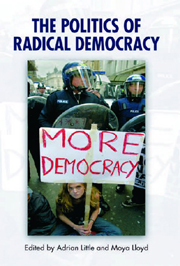Book contents
- Frontmatter
- Contents
- Acknowledgements
- Notes on the Contributors
- Introduction
- 1 Rhetoric and Radical Democratic Political Theory
- 2 Performing Radical Democracy
- 3 Aboriginal Sovereignty and the Democratic Paradox
- 4 Judith Butler, Radical Democracy and Micro-politics
- 5 Post-structuralism, Civil Society and Radical Democracy
- 6 Hegemony and Globalist Strategy
- 7 Is ‘Another World’ Possible? Laclau, Mouffe and Social Movements
- 8 Friends and Enemies, Slaves and Masters: Fanaticism, Wendell Phillips and the Limits of Agonism
- 9 The Northern Ireland Paradox
- Conclusion
- Bibliography
- Index
6 - Hegemony and Globalist Strategy
Published online by Cambridge University Press: 12 September 2012
- Frontmatter
- Contents
- Acknowledgements
- Notes on the Contributors
- Introduction
- 1 Rhetoric and Radical Democratic Political Theory
- 2 Performing Radical Democracy
- 3 Aboriginal Sovereignty and the Democratic Paradox
- 4 Judith Butler, Radical Democracy and Micro-politics
- 5 Post-structuralism, Civil Society and Radical Democracy
- 6 Hegemony and Globalist Strategy
- 7 Is ‘Another World’ Possible? Laclau, Mouffe and Social Movements
- 8 Friends and Enemies, Slaves and Masters: Fanaticism, Wendell Phillips and the Limits of Agonism
- 9 The Northern Ireland Paradox
- Conclusion
- Bibliography
- Index
Summary
Globalisation is an essentially contested concept which seeks to capture the contemporary shift in scale of social and economic processes, from the local and the national to the inter-continental and the planetary. The onset of globalisation has clear implications for conventional accounts of democracy, and this has been at the fore-front of debates in political theory over the past decade. There is widespread recognition that globalisation undermines the capacity of national governments to exercise sovereign authority over their territory, especially in the developing world where newly emergent states have established their formal independence from former colonial powers. To the extent that national governments are understood in conventional democratic theory to be the legitimate representatives of the people, globalisation undermines democracy. Political theorists of different persuasions have re-examined the theory and practice of democracy under conditions of globalisation. Most prominent in this respect has been the emergence of liberal theories of cosmopolitanism and of ‘global civil society’. This paper seeks to make modest steps towards the development of a theory of ‘radical democracy’ appropriate to the era of globalisation.
The term ‘radical democracy’ can be used in a broad sense to refer to a range of contemporary thinkers associated with post-structuralism and left politics, including Ernesto Laclau, Chantal Mouffe, Judith Butler and William Connolly. These theorists share important points of commonality – an emphasis on the primacy of the political, on the contingency of identity formation, and on the agonistic nature of democratic politics – that sets them apart from other contemporary approaches such as analytical liberalism and deliberative democracy.
- Type
- Chapter
- Information
- The Politics of Radical Democracy , pp. 112 - 132Publisher: Edinburgh University PressPrint publication year: 2008



